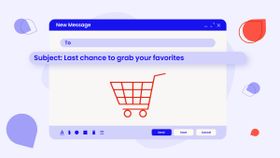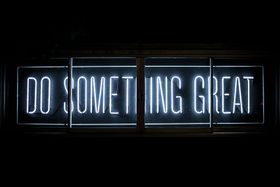WhatsApp B2B Marketing: A Viable Marketing Strategy?
Looking to spruce up your B2B marketing efforts? Find out whether WhatsApp is a suitable marketing strategy for you.
Updated April 4, 2024.

With a staggering two billion active users worldwide, WhatsApp has become a powerhouse for businesses seeking direct connections with their audience. Its intuitive interface, global reach, affordability, and constant innovations (including chatbots and the WhatsApp API) have led businesses of all sizes to adopt this platform.
Below, we explore WhatsApp's benefits for B2B, how to successfully engage with clients on WhatsApp, and how to integrate your WhatsApp marketing efforts with email marketing and SMS campaigns.
Meet the expert
Jameela Ghann is a seasoned online store owner with over a decade of eCommerce experience. Apart from running Alora Boutique, she's also the marketing manager for Fera Product Reviews.
What makes WhatsApp suitable for B2B marketing?
B2B (business-to-business) marketing has key characteristics that set it apart from B2C (business-to-consumer). This includes longer sales cycles, more complex products and services, and data-driven decision-making. But the core of B2B marketing comes down to personal relationships.
89% of B2B clients are more likely to buy from you if they have a strong relationship with your company. This is because they need to trust you and be sure you truly understand their business's needs—otherwise, how do they know you're capable of addressing those needs?
This is where WhatsApp comes into play. It can significantly enhance your marketing efforts through:
- Personalized communication: WhatsApp provides a unique avenue for your business to communicate with B2B clients in a personalized and conversational manner, helping you foster trust and build strong rapport.
- Real-time engagement: Real-time interactions make it highly effective for promptly addressing queries and concerns. 80% of B2B clients expect it now.
- End-to-end encryption for security: This ensures that messages you exchange with clients are secure and private, which is vital for safeguarding sensitive business information.
- Versatility in B2B functions: WhatsApp is a versatile tool that can be used for various functions, including lead generation, customer support, and sales.
Getting started: How to target and engage B2B clients on WhatsApp
First, create a WhatsApp Business account. This will give you access to features like analytics and messaging tools that make it easier to manage your B2B marketing efforts.
Next, you need to build a contact list. Here are some ways you could do that:
- Import contacts from your CRM system
- Create lead magnets that allow people to opt into WhatsApp messaging
- Attend industry events
- Connect with businesses on LinkedIn
Pro tip: want to automate your marketing on WhatsApp? Check out our list of the top WhatsApp marketing tools.
Build trust and transparency on WhatsApp
Once you're set up and have your contact list, it's imperative to maintain a level of professionalism on the platform. Just because you use WhatsApp in a personal capacity doesn't mean you can apply that same approach to business clients. Remember that 65% of B2B clients have stopped doing business with companies that communicate unprofessionally.
To avoid this, keep these best practices in mind:
- Your WhatsApp Business account should have a professional profile photo, such as a logo, headshot of a key employee, or image of your business premises.
- Ensure that your messages are clear, concise, and free of errors. Avoid using slang or informal language.
- Respond to messages from clients within 24 hours. Being responsive will show that you value their time and are committed to providing excellent service.
- Always respect your clients' privacy. Keep their information confidential and don't share it with any third parties without their consent.
- Focus on cultivating genuine customer relationships and delivering value. Refrain from being overly promotional; otherwise, your clients may block you or even report your business as spam.
Integrate WhatsApp with email and SMS marketing for maximum impact
Another great capability of WhatsApp B2B marketing is how easily you can integrate it with existing email and SMS marketing strategies. This omnichannel approach to B2B marketing is important, and a staggering 94% of B2B buyers prefer it. Here are some tips to manage WhatsApp, email, and SMS marketing strategies:
1. Segment your audience
Audience segmentation is important because it allows you to send targeted and relevant messages to your audience. This can lead to higher open rates, click-through rates, and conversion rates.
You can segment your audience by:
- Demographics (age, gender, location, etc.)
- Psychographics (interests, values, lifestyle, etc.)
- Purchase history (products purchased, frequency of purchase, etc.)
- Engagement (how they interact with your brand on social media, website, etc.)
Just remember to keep these best practices in mind for each channel:
- WhatsApp: Keep your messages concise and to the point. Avoid sending promotional messages too often.
- Email: Email is great for sending longer-form content, such as blog posts, e-books, and case studies. You can also send promotional messages; just be sure to personalize your messages.
- SMS: SMS is best for sending short, urgent messages, such as reminders, alerts, and promotions. But avoid sending too many SMS messages, as this can be annoying to your recipients.
2. Create a consistent message
Having a consistent message across all channels is important because it helps to increase brand awareness and recognition, improve customers' experiences, and increase sales.
One of the best methods to achieve this is developing a brand voice style guide. This document outlines the essential elements of your brand voice, such as tone, personality, and language style.
Once finalized, share your brand voice style guide with your team. Ensure that everyone who communicates on behalf of your brand is familiar with and follows your brand voice guidelines. Consider hosting formal training sessions, one-on-one coaching, or providing your team with templates and examples.
If you choose to go the template route, ensure each template is:
- Customized to fit the specific channel
- Responsive, so it looks good on all devices
- Tested to make sure that it works properly
3. Track your results
Tracking results from WhatsApp, SMS, and email marketing campaigns helps you determine which channels are performing best. Use your data to optimize your campaigns and get the most out of your marketing efforts.
Get started by tracking these metrics:
- Open rates
- Click-through rates
- Conversion rates
- Return on investment (ROI)
These metrics are similar to those used in standalone campaigns, but you should consider cross-channel attribution. This lets you see how your WhatsApp, email, and SMS campaigns are working together to influence customer behavior.
» Discover how to create an email marketing journey that works.
Successful omnichannel marketing in action
Ula, an Indonesian online wholesale marketplace, uses omnichannel marketing to keep a high bar for customer experience and grow its business.
- 16x growth in SMS communications in 1 year
- 200k active users engaged in SMS each month
- 97% customer satisfaction
Ula uses SMS to send customers secure OTPs and update them about payments and when orders are out for delivery or ready for pickup. Additionally, Ula uses WhatsApp to collect customer feedback on their post-purchase experience via a custom chatbot that they built specifically for this purpose.
Overall, Ula has seen a significant increase in the volume and granularity of customer satisfaction because they engage on multiple platforms.
From hi to buy: Navigating WhatsApp marketing success
Ultimately, your success WhatsApp depends on building genuine connections with your clients. You must provide valuable content, responsive support, and timely replies to your inquiries. Additionally, stay true to WhatsApp's intended usage and refrain from spamming.
Only engage with customers who've opted in, and maintain a balanced frequency of promotional messages. Lastly, keep a close eye on your analytics: they're your compass to refining what works and leaving behind what doesn't.
But if you prefer to get your head-start with an expert, Mayple can set you up with the right vetted B2B marketer for your business.








